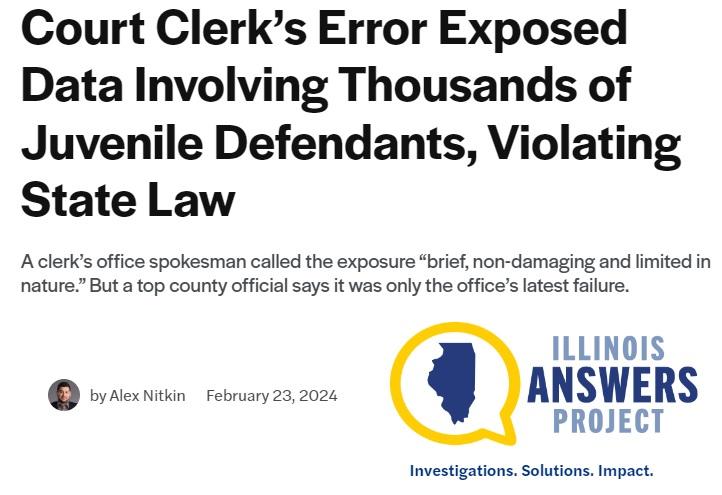Comment on the Clerk of the Court Data Breach
Chicago Appleseed has long been a vocal critic of the Office of the Clerk of the Court, advocating for a higher level of professionalism, accountability and better data management. We believe that the office has a duty to the public—both litigants and non-litigants alike—to share general information about the courts and the management of cases easily and on-demand. Not only does this assist self-represented people better navigate the court process, but also facilitates public oversight and understanding of the role and impact of courts in our communities.
Unfortunately, as reported by Alex Nitkin at the Illinois Answers Project, in January, the Clerk of the Court’s “office accidentally exposed online the names of at least 5,000 children charged with crimes” as part of an on-going, long overdue effort to modernize the case management system. The reported breach demonstrates that the Office has not reached a level of professionalism and administrative competence necessary to effectively administer its mandate. Furthermore, in responding to the data breach, the Clerk of the Court’s office minimized the seriousness of the error from a policy and statutory compliance perspective, while simultaneously shielding information about how many records were exposed and for how long.
The Clerk of the Court is primarily an administrative one: the office responsible for all non-judicial functions of the court. It is a heavy responsibility, carrying a number of meaningful professional requirements. Transforming the office into a modern, efficient, public-facing office will require careful planning, an office-wide audit of all office functions, core competencies and staffing levels to ensure the effective use of resources and identify gaps in those resources. The Clerk of the Court’s office should serve the public by administering the court’s records, filings and dockets in accordance with the law, but in an open and transparent manner, with a focus on public accountability and access. The Clerk of the Court herself should be an administrator first; a professional with meaningful experience managing large systems, an extensive budget and thousands of skilled employees.
As we have noted in our forthcoming voter guide to the 2024 election, the Clerk of the Court serves several constituencies (the court, legal practitioners, litigants and the public) who sometimes have overlapping interests and needs and sometimes have competing ones. The Clerk must balance these carefully.
As we laid out in our New Directions report—released in September 2020 and written in conjunction with the Civic Federation and the Chicago Council of Lawyers—the change in leadership in the last election offered an unique opportunity to transform the office into one that is public-facing, fundamentally community-oriented, and accountable. We are still looking for that change.
To learn more about the Clerk of the Circuit Court of Cook County and the candidates running in 2024, visit:
- What Does a Court Clerk Do and How Do You Become One? (Rasmussen University, 2019)
- Offices on the Ballot for the March 19, 2024, Presidential Primary (Chicago Board of Election Commissioners)
- New Directions for the Office of the Clerk of the Cook County Circuit Court (Chicago Appleseed Center for Fair Courts, Chicago Council of Lawyers, Civic Federation): Recommendations for Planning and Transitioning to New Leadership (2020) & One Year Progress Report (2021)

